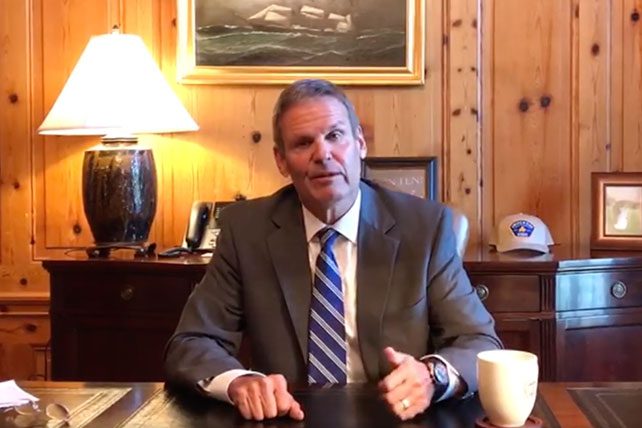Tennessee Governor Bill Lee, who’s vocal about his religious faith, has proclaimed October 10 as an “official day of prayer and fasting for our state.” In a video posted online, the Republican leader invites residents to join him and his wife, Maria, to devote that Thursday to prayers of healing, forgiveness, thanksgiving, and hope. “Prayer,” he says, “strengthens our families and it strengthens our communities, it strengthens our relationship with our neighbors, it strengthens our relationship with God himself.”
Lee credits the idea to the “countless” Tennesseans he’s met who say they’re praying for him. In his video, the governor expresses appreciation for all these intercessions. “We know that God hears them,” he says. “We know that prayer accomplishes much.”
Tennessee Has a Strong Faith Base
Of the state’s 6.7 million residents, 81 percent say they’re Christian; of those, 52 percent call themselves evangelicals. According to the Pew Research Center, Tennessee is America’s third most religious state, after Alabama and Mississippi. In a 2016 survey, 73 percent of Tennessee adults identified themselves as “highly religious.”
America has a National Day of Prayer, observed on the first Thursday in May, but governors sometimes declare a day of prayer for a state—often during emergencies. This year, for example, several Midwestern governors made such proclamations following severe flooding.
But prayer shouldn’t be “strictly regulated to disaster or tragedy,” according to Laine Arnold, Gov. Lee’s press secretary. “Prayer is an umbrella that covers the gamut of human experience.”
Critics: Bill Lee’s Proclamation Is Exclusive, Insensitive
As expected, the governor’s declaration has ruffled some feathers. It’s “inappropriate for a governor to sort of exhort citizens to pray on a particular day,” says Rebecca Markert, legal director of the Freedom From Religion Foundation. “What’s upsetting about this announcement…is just how much he talked about the importance of prayer and how God hears prayers and answers them.” That leads to a sense of exclusion for “people of nonfaith,” she adds.
About 14 percent of Tennesseans say they’re unaffiliated with a religion.
Lee is also taking some heat for the day’s timing, which immediately follows the Jewish holy day of Yom Kippur. As Rabbi Craig Lewis explains to the Chattanooga Times Free Press, Jews will fast from sunset on October 8 to sunset on October 9, and they’re prohibited from fasting for two consecutive days.
“While there is no objection to prayer, because all prayer can be helpful, declaring a day of fasting after all the Jews in the state have fasted for a day seems a little insensitive,” says Lewis. “To have a day of prayer in our state is a good thing as long as it leaves open the possibility for everyone to pray in their own way.” About one percent of Tennessee adults identify as Jewish.
Arnold, the governor’s press secretary, points out that the “invitation to pray, reflect, and fast” is “free for individuals to engage [in] as they see fit.” Gov. Lee, adds Arnold, considers this proclamation “as a table that is open for everyone.”

